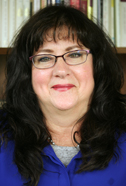Strategic vision reveals faith in the future of Catholic schools

Photo Caption: Dr. Sharon Weiss, superintendent of Catholic Schools for the Diocese of Peoria, says Catholic schools are “an evangelizing and teaching arm of the Church.”
By: By Jennifer Willems
After a year of working with diocesan schools to collect information, surface best practices and see where more support is needed, the Office of Catholic Schools of the Diocese of Peoria has started to share why there is cause to have “Faith in Our Future.”
The strategic vision, which will be implemented this year and developed over the next five years, was unveiled earlier this month at the annual retreat for the principals at Nazareth House in rural Henry. Dr. Sharon Weiss, superintendent, said the guiding principles, goals and objectives would be shared with the Diocesan Education Commission, clergy and public as soon as the plan is published.
Bishop Daniel R. Jenky, CSC, received a preliminary summary of the findings in June.
“He was very pleased,” Weiss said. “He’s very excited that we are definitely in line with what he envisions for his schools and that there is a plan in place to help him achieve that.”
She said that if the all the schools weren’t on the same path yet, “I think we at least know where we’re walking to.”
“Change is digested on many different levels,” Weiss explained. “We always have those who are eager for the change and willing to move forward with it, those who want to study it a little more, and those who resist. My role and the office’s role is to help them see that we’re all in this together and that we must row the boat in the same direction.”
That started last fall when the schools were asked to look at their mission and Catholic identity, academic excellence, governance and leadership, and operational vitality, using a template developed by the Office of Catholic Schools. The goal was to get everyone speaking a common language, Weiss said.
The process included 43 of the 44 elementary schools, high schools and academies in the Diocese of Peoria. St. Bede Academy, which is a sponsored ministry of the Benedictine monks at St. Bede Abbey, did not participate.
In addition to Weiss, the team guiding the process included Jerry Sanderson and Dr. Susan Stolt, associate superintendents, and Bill Engelbrecht, director of advancement for the diocese.
MAKING HELP AVAILABLE
Among the many good things happening in diocesan schools is that students taking a faith assessment required by the National Catholic Educational Association in grades five, eight and 11 had scores that exceeded the national average.
It is no surprise that academics are a strength, she added.
“We have rigor and we have relevance,” Weiss said. “All of our elementary schools exceeded the national average on standardized testing — every one of them — and our high school outcomes were superior. What’s more, we have the data now to show that our diocesan high schools are outperforming most of the best public high schools . . . that are touted by the media.”
Another finding that didn’t come as a surprise is that enrollment needs to be addressed. Weiss said that in the last decade enrollment had declined by 21 percent, with only seven of the 43 schools adding students.
“This is where we feel we need to do the most direct and immediate intervention,” she told The Catholic Post, noting that recruitment, retention and marketing are areas where “outside coaching and diocesan support” are being considered.
“Even though it would be ideal if every school could have a marketing director or an advancement director, in terms of budget that is a huge burden,” Weiss said. “So perhaps the diocese could play a role in that and help with some regional personnel that can assist schools. . . . This is an area where we’re just not trained as educators.”
The schools also indicated that scholarships and funding need to be addressed if they are going to attract families that might not be able to afford the tuition. Weiss said the Rooted in Faith capital campaign has been “a fantastic effort,” but the schools are saying, “We need more.”
SENSE OF IMMEDIACY
When it comes to curriculum, “there is a tremendous willingness to change in our schools and innovation must become a priority.” She said the OCS staff encouraged the principals to be willing to change not only their technology, but to infuse their curriculum with the arts.
“We are seeing the benefits of what instrumental and vocal music and foreign language, art and drama can bring to shaping the character of our children,” Weiss said. “Our church is full of beauty, so why would we not want our children educated in that as well?”
If growth is good for the students, it is also good for school administrators, teachers and staff, according to “Faith in Our Future.” The objectives recommended in the strategic vision call for ongoing faith formation and an evaluation and professional growth model that will have some common elements as well as areas that can be tailored to each person’s strengths and weaknesses.
While the plan is strong on accountability, Weiss said that goes both ways.
“When we started designing this process it came out very clearly among our team that we have to stick with them through this,” she said told The Post. “We told the principals we are not going to allow this to sit on a shelf.”
The governance structures in each school will be involved so that goals can be met, but not have everything fall on the pastor or the principal.
“We’re trying to say to them, ‘We have as much invested in this as you do,'” Weiss said. “There’s a sense of immediacy here. We’ve got to get moving.”





